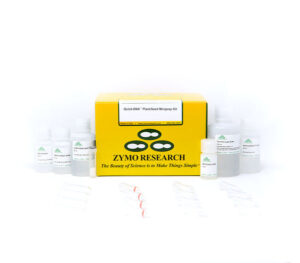
Quick-DNA Plant/Seed 96 Kit
D6021
| Cat # | Name | Size |
|---|---|---|
| D6021 |
Quick-DNA Plant/Seed 96 Kit |
50 Preps |
highlights
- ✓ Rapid, simple, high-throughput (96-well) method for DNA isolation from tough-to-lyse plant and seed samples.
- ✓ Ultra-high density BashingBeads are fracture resistant and chemically inert.
- ✓ Zymo-Spin technology coupled with filtration removes polyphenolic PCR inhibitors from the DNA product.
- The Quick-DNA Plant/Seed 96 Kit is a plant DNA isolation kit designed for the simple, rapid isolation of inhibitor-free, PCR-quality DNA from a variety of plant sample sources including leaves, stems, buds, flowers, fruit, seeds, etc. The procedure is easy and can be completed in minutes: plant samples are rapidly and efficiently lysed by bead beating with our state of the art, ultra-high density BashingBeads. Polysaccharides, lipids, and polyphenols/tannins are removed from the DNA using our Zymo-Spin technology. The eluted DNA is ideal for downstream molecular-based applications including PCR, arrays, etc.
| Applicable For | All sensitive downstream applications such as qPCR and Next-Generation sequencing. |
|---|---|
| Elution Volume | ≥ 50 µl |
| Equipment | Centrifuge w/ microplate carriers, 96-well plate/block disruptor or pulverizer. |
| Processing Volume | ≤ 80 mg |
| Purity | A260/A280 nm ≥1.8. |
| Sample Source | Leaves, stems, buds, flowers, fruit, seeds, etc. |
| Sample Storage | DNA stored at ≤ -20°C. |
| Size Range | Capable of recovering genomic DNA up to and above 40 kb. Typical fragment sizes range from 25 kb – 35 kb. If present, parasitic and viral DNA will also be recovered. |
| Type | Total DNA |
| Yield | ≤ 5 µg total DNA |
Kits Component
| Cat # | Name | Size |
|---|---|---|
| S6002-96-2 | ZR-96 BashingBead Lysis Rack | 2 mm |
| C2009 | Silicon-A-HRC Plate | 2 Plates |
| C2003 | Elution Plate | 2 Plates |
| C2002 | Collection Plate | 2 Plates |
| C2007-4 | 96-Well Plate Cover Foil | 4 Foils |
| P1001-2 | 96-Well Block | 2 Blocks |
| C2001 | Silicon-A Plate | 2 Plates |
| D6035-1-30 | Prep Solution | 30 ml |
| D6001-3-40 | BashingBead Buffer | 40 ml |
| D3004-5-50 | DNA Pre-Wash Buffer | 50 ml |
| D3004-4-10 | DNA Elution Buffer | 10 ml |
| D3004-2-100 | g-DNA Wash Buffer | 100 ml |
| D3004-1-150 | Genomic Lysis Buffer | 150 ml |
PRODUCT FAQ
Q1: Can you provide a list of the tested plant species?
We currently do not have a list of plants, aside from what we have shown in the protocols: – A.thaliana – Juniper – Milkweed Leaf – Milkweed Leaflet – Milkweed Pre-Flowering Bud – Corn Kernel – Sunflower Seed – Nicotiana sp.
Q2: My lysate seems viscous. What is causing this to happen? How can I fix this?
A viscous sample can indicate incomplete sample lysis. Try using less of your sample and optimize bead beating conditions (duration, speed, time) to ensure samples are thoroughly lysed. After bead beating, pellet the cell debris before moving on. Adding more Genomic Lysis buffer to the lysate can help dilute and deproteinate the sample, making the sample less viscous and more suitable for DNA recovery.
Q3: What is the purpose of Silicon-A-HRC Plate step?
Environmental samples often contain inhibitors such as polyphenolics, humic/fulvic acids, tannins, melanins, etc. that often co-purify and affect downstream applications such as PCR. The Zymo-Spin III-HRC column removes these polyphenolic PCR inhibitors to recover DNA that is ready for sensitive downstream applications such as Next-Gen Sequencing, quantitative PCR, etc.
Q4: Is it necessary to add beta-mercaptoethanol? Can this step be substituted or omitted?
Addition of beta-mercaptoethanol is recommended to enhance sample lysis, but can be substituted with dithiothreitol (DTT, final concentration of 10 mM). However, if bead beating is optimized and lysis is efficient, the addition of BME is not necessary and can be omitted.
Q5: When can an RNase A treatment be implemented in the protocol?
The Quick-DNA kits recover RNA-free genomic DNA. The selective chemistry allows for binding of double stranded DNA to the column and for RNA to flow through. No RNase A treatment is required when processing samples within kit capacity.

